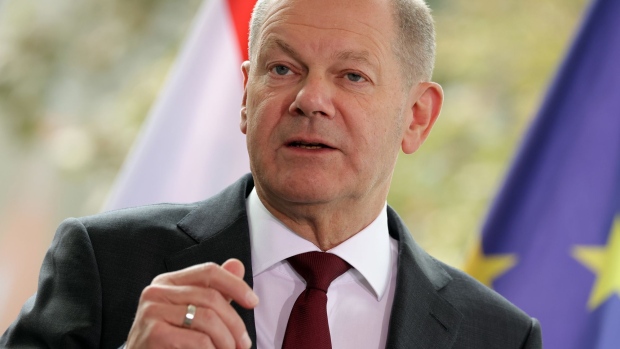Oct 11, 2022
Scholz Plans China Visit Around Nov 3-4 ahead of G-20 Summit
, Bloomberg News

(Bloomberg) -- German Chancellor Olaf Scholz plans to travel to China around November 3-4 in a delicate balancing act to discuss business interests and human rights violations, people familiar with the matter said.
It will be Scholz’s first China visit as German leader since taking office in December and the chancellor will use the talks in Beijing to also seek clarification on China’s ambivalent role in the conflict over Russia’s military invasion in Ukraine, one of the people said.
In a separate trip to Asia, Scholz plans to visit Vietnam and Singapore with a huge business delegation around November 12-14 before heading on to the Group of Twenty leaders summit in Bali, Indonesia, on November 15-16 where the conflict in Ukraine is likely to take center stage, one of the people said.
Scholz’s travel plans are part of a broader effort to reshape Germany’s strategy in the Asia-Pacific region that could increase tension with Chinese President Xi Jinping. But the chancellor has made it a priority to meet Xi to seek better ties. Despite the differences, Scholz is convinced that Europe needs China as a partner in the international fight against climate change.
Germany’s government is working to hone a new national strategy on China that aims to ensure less reliance on the world’s second largest economy, diversify supply chains and enhance security.
Decades of economic entanglement under Scholz’s predecessors Gerhard Schroeder and Angela Merkel have made China Germany’s most important trading partner in terms of imports and exports combined.
Defend Globalization
Speaking at a business conference in Berlin, Scholz defended his nuanced approach on China. “Globalization has been a success story that enabled prosperity for many people. We must defend it,” Scholz said. “Decoupling is the wrong answer.”
The chancellor added that his government was aiming to diversify business ties. “We don’t have to decouple from some countries,” he said. “I say emphatically we must continue to do business with China. But we also have to ensure that we trade with the rest of the world, look at the rest of Asia, Africa, South America - that’s the opportunity.”
European Commission Vice President Valdis Dombrovskis told the conference Brussels shared the view that decoupling from China is not an option for European companies. “Our trading relationship needs more balance and reciprocity,” Dombrovskis said, calling China an important growth market and supplier of affordable components.
“I would therefore argue that the focus should be on diversification and better risk management. In parallel, the EU should continue engaging with China with pragmatism and without naivety,” Dombrovskis said.
Human Rights
Germany’s shift in policy and tone brings it more in line with the US and other allies who have raised mounting concern over China under Xi. The European Union has taken issue with China’s human rights record in Hong Kong and Xinjiang as well as its actions on Taiwan and the South China Sea.
Scholz used his first speech as chancellor at the United Nations last month to denounce China’s human rights record and called on Beijing to implement the recommendations of a recent report on the treatment of Uyghurs in Xinjiang by the former High Commissioner for Human Rights, which accused China of “serious” rights abuses there.
While recently European firms have said they’re becoming more cautious on investment plans for China due to the Covid Zero policy and other factors, large German firms are still increasing their already substantial investments in the country.
Investment from the EU into China was up 15% in the first half of 2022 compared to a year ago, according to data from Rhodium Group, helped by BMW AG’s purchase of a controlling stake in its car-making joint-venture in the first quarter, and it also opened a multibillion-dollar factory extension early this year in Shenyang in the northeast of the country.
Audi is building its first electric vehicle plant in the country and Airbus SE is cementing its position in the Chinese market thanks to a local final assembly line that helped it score an order worth more than $37 billion earlier this year.
Last month German chemical maker BASF SE opened the first stage of its new plant in the country. The factory is planned to be one of the largest single foreign investments ever in China and the largest investment by BASF, which is planning to spend up to 10 billion euros ($9.7 billion) by 2030, according to a company statement.
(Updates with Dombrovskis comments in ninth, tenth paragraphs)
©2022 Bloomberg L.P.








